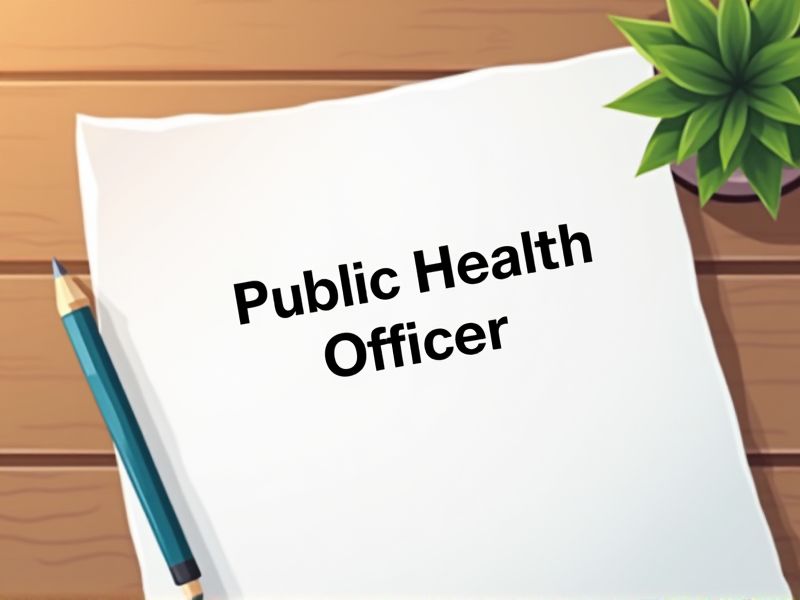
Public Health Officers require specific certifications to ensure they possess the crucial skills and knowledge necessary to address diverse health challenges effectively. Certification provides validation of expertise and dedication to upholding public health standards. It also equips professionals to manage programs and implement policies that mitigate public health risks. Key certifications to consider for this role include those that enhance competencies in these areas.
Certified in Public Health (CPH)
Acquiring the Certified in Public Health (CPH) credential often leads to increased job opportunities, as it validates a professional's knowledge and expertise in the field. Many employers across public health sectors prioritize candidates with CPH certification because it demonstrates commitment to continuing education and adherence to industry standards. The certification process enhances one's understanding of core public health principles, which can improve the quality and effectiveness of health programs and policies. Holding a CPH credential may contribute to professional growth and recognition, often leading to career advancement and potential salary increases.
Certified Health Education Specialist (CHES)
Having a Certified Health Education Specialist (CHES) as a Public Health Officer ensures that public health programs are developed and implemented based on evidence-based practices. The CHES credential indicates proficiency in crucial areas like health communication and program planning, often increasing the effectiveness of health interventions. The specialized knowledge and skills associated with CHES can significantly improve community health outcomes by tailoring education initiatives to meet specific public needs. Furthermore, CHES certification often facilitates collaboration with other health professionals, optimizing resource use and enhancing public health policy development.
Infection Control Certification (CIC)
Infection Control Certification (CIC) equips Public Health Officers with evidence-based knowledge to effectively prevent and manage infectious disease outbreaks. It enhances their competency in implementing infection control protocols, reducing healthcare-associated infections. Certified officers are better qualified to educate healthcare staff and the community, fostering greater adherence to preventative measures. Employers often require or prefer CIC-certified individuals, reflecting the growing emphasis on expert-led infection prevention in public health settings.
Public Health Emergency Preparedness (PHEP) Certification
Public Health Emergency Preparedness (PHEP) Certification equips Public Health Officers with specialized skills to handle crises efficiently, thereby mitigating the impact on communities. Proper training ensures that officers can implement evidence-based strategies quickly, reducing delays in critical response times. Certification also aligns officer competencies with national standards, creating consistency in emergency management across different regions. With the increasing frequency of public health emergencies, certified officers demonstrate preparedness and foster public trust in health systems.
Certified Clinical Research Professional (CCRP)
Certified Clinical Research Professionals (CCRP) provide expertise in evidence-based practices critical for effective public health interventions. They ensure that clinical studies comply with ethical and regulatory standards, safeguarding community health interests. Their role in data integrity directly impacts the reliability of health research findings and subsequent policy decisions. Public Health Officers with CCRP certification can better bridge the gap between clinical research and public health strategies.
Lean Six Sigma Green Belt Certification
Lean Six Sigma Green Belt Certification enhances a Public Health Officer's ability to identify and eliminate inefficiencies in public health processes, leading to improved service delivery. It equips the officer with data-driven decision-making skills, which are crucial in designing and implementing effective health interventions. Certification in this methodology fosters a culture of continuous improvement and accountability within public health organizations. Acquiring these skills can result in better resource management and enhanced patient outcomes, directly impacting community health.
Certified Emergency Manager (CEM)
The role of a Certified Emergency Manager (CEM) enhances a Public Health Officer's response capabilities during crises by integrating systematic emergency planning. With CEM training, the officer gains skills in mobilizing resources efficiently, crucial for managing public health emergencies. Equipped with CEM credentials, a Public Health Officer fosters better coordination among various agencies, improving overall disaster response. This certification ensures adherence to best practices in emergency management, minimizing public health risks during disruptive events.
Project Management Professional (PMP)
The PMP certification enhances a Public Health Officer's ability to efficiently manage and execute healthcare projects by providing a standardized framework. Mastery of project management tools and techniques leads to improved resource allocation and accountability in public health initiatives. The rigor of PMP training ensures that officers can navigate complex regulatory environments and stakeholder expectations. This expertise contributes to more effective public health outcomes, as timely and organized interventions can significantly impact community health.
Registered Environmental Health Specialist (REHS)
The role of a Registered Environmental Health Specialist (REHS) is crucial for a Public Health Officer due to their expertise in identifying and mitigating environmental health risks, which directly affects community well-being. Their skills in assessing water quality, food safety, and sanitation standards ensure public safety and prevent disease outbreaks. By conducting inspections and enforcing health regulations, REHS contributes to maintaining compliance with public health laws and standards. Their specialized knowledge enables Public Health Officers to develop and implement effective health policies and programs that enhance community health outcomes.
Occupational Safety and Health Administration (OSHA) Certification
OSHA certification provides Public Health Officers with the necessary knowledge to identify workplace hazards effectively, which reduces the risk of accidents and injuries. The training ensures they comply with health and safety regulations, which is a legal requirement in many regions and sectors. Enhanced skills in risk assessment and management directly contribute to creating healthier and safer work environments for the community. A certification often leads to better job opportunities and career advancement as it demonstrates a commitment to safety and continuous professional development.
Summary
You can anticipate increased trust in Public Health Officers who obtain certifications, as these credentials often signify expertise and up-to-date knowledge. Certifications enhance an officer's capacity to implement effective health interventions, thereby improving public health outcomes. This professional development may also expand an officer's career opportunities and leadership roles within the health sector. The community benefits from more informed public health strategies, owing to the officer's enhanced skills and competencies.
